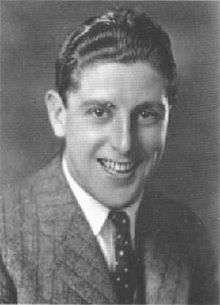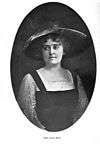A. Edward Sutherland
| A. Edward Sutherland | |
|---|---|
 | |
| Born | January 5, 1895 |
| Died | December 31, 1973 (aged 78) |
A. Edward Sutherland aka Eddie Sutherland (January 5, 1895 – December 31, 1973) was a film director and actor. Born Albert Edward Sutherland in London, he was from a theatrical family. His father, Al Sutherland, was a theatre manager and producer and his mother, Julie Ring, was a vaudeville performer. He was a nephew of both Blanche Ring and Thomas Meighan, who was married to Frances Ring, another of his mother's sisters.[1]
Sutherland acted in 37 known films early in his career, beginning as a Keystone Cop in Tillie's Punctured Romance (1914), which starred Charles Chaplin, Mabel Normand, and Marie Dressler.
Career

Sutherland was directed by Charles Chaplin in A Woman of Paris (1923), two years before Sutherland began his directing career with the help of Chaplin.
He is best known as a director; he directed more than 50 movies between 1925 and 1956. His breakout film was Behind the Front (1926), which made stars of the two leads and established Sutherland as a comedic director.[2] Frequently billed as "Eddie Sutherland," he is often noted for having an especially hard time working with Stan Laurel, whom he disliked ("I'd rather eat lunch with a tarantula than work with Laurel again"). He became close friends with the more famously acerbic W.C. Fields, with whom he established a lifelong friendship.
Sutherland's last directing assignment was working on the Mack & Myer for Hire TV comedies with Joey Faye and Mickey Deans for Sandy Howard TV Productions and Trans-Lux Television in 1965. (Info can be found at www.tvparty.com.)
Personal life
Sutherland was married five times. Among his wives were Marjorie Daw (from 1923 to 1925) and Louise Brooks (from July 1926 to June 1928). He and Brooks met on the set of It's the Old Army Game, which he directed and which also co-starred his aunt Blanche Ring. Brooks and Sutherland did not have a happy marriage; there were numerous reports on both sides of infidelity. He did not have children in either of his marriages.
Partial filmography as actor
- The Danger Girl (1916)
- Which Woman? (1918) directed by Tod Browning
- Love Insurance (1919)
- A Girl Named Mary (1919)
- All of a Sudden Peggy (1920)
- The Paliser Case (1920)
- Conrad in Quest of His Youth (1920) directed by William C. deMille
- The Witching Hour (1921) directed by William Desmond Taylor
- The Dollar-a-Year Man (1921)
- Nancy from Nowhere (1922)
- The Ordeal (1922)
- The Loaded Door (1922)
- The Dramatic Life of Abraham Lincoln (1924)
Partial Filmography as Director
Silent era

- Coming Through (1925) with Wallace Beery
- Wild, Wild Susan (1925) with Bebe Daniels
- A Regular Fellow (1925) with Tyrone Power, Sr.
- Behind the Front (1926) with Wallace Beery and Raymond Hatton
- It's the Old Army Game (1926) with W. C. Fields, Louise Brooks and Blanche Ring
- We're in the Navy Now (1926) with Wallace Beery
- Love's Greatest Mistake (1927)
- Fireman, Save My Child (1927) with Wallace Beery
- Tillie's Punctured Romance (1928) with W.C. Fields (completely different from the 1914 film)
- What a Night! (1928) with Bebe Daniels
Sound era
- Pointed Heels (1929) with William Powell and Fay Wray
- Fast Company (1929)
- The Dance of Life (1929) co-director with John Cromwell
- Paramount on Parade (1930) co-director with 10 other directors; all-star Paramount revue
- June Moon (1931) with Jack Oakie and Frances Dee
- Up Pops the Devil (1931) with Carole Lombard
- Palmy Days (1931) with Eddie Cantor
- Secrets of the French Police (1932)
- Sky Devils (1932) with Spencer Tracy
- Mr. Robinson Crusoe (1932) with Douglas Fairbanks
- Too Much Harmony (1933) with Bing Crosby
- International House (1933) comedy film with W. C. Fields
- Murders in the Zoo (1933) with Lionel Atwill
- Mississippi (1935) with Bing Crosby and W. C. Fields
- Diamond Jim (1935) biographical drama
- Poppy (1936) with W.C. Fields
- Every Day's a Holiday (1937) with Mae West
- The Flying Deuces (1939) with Stan Laurel and Oliver Hardy
- The Invisible Woman (1940) with John Barrymore
- Beyond Tomorrow (1940) fantasy film
- One Night in the Tropics (1940), Abbot and Costello movie
- The Boys from Syracuse (1940)
- The Navy Comes Through (1942)
- Dixie (1943) with Bing Crosby
- Follow the Boys (1944) with George Raft
- Abie's Irish Rose (1946)
- Bermuda Affair (1956) with Kim Hunter
References
External links
- A. Edward Sutherland at the Internet Movie Database
- Julie Ring, Eddie's mom, in a series of stage portraits
- A. Edward Sutherland at Virtual History
|